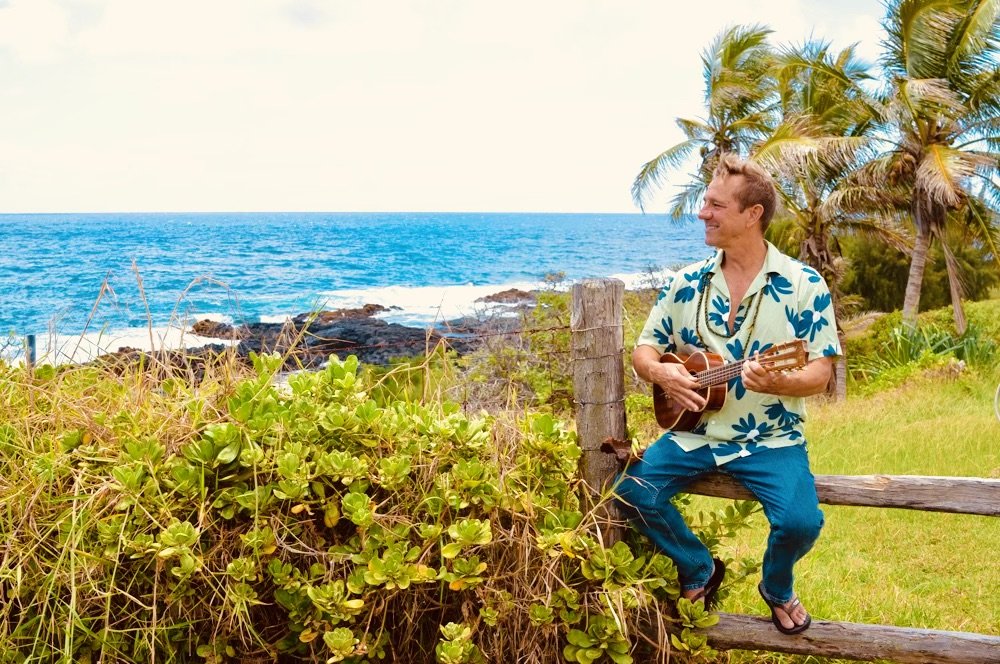ABOUT LEOKĀNE
MISSION: PROTECT NATIVE
HAWAI`I FOR EVERMORE
Leokāne Pryor was born and raised in the mystical Mānoa Valley of Oʻahu, surrounded by the tropical breezes, sweet flower fragrances, birdsong, and the mo'olelo of Hawai’i (the passing of Hawaiian stories through song and chant). From a young age, Leokāne was drawn to Hawaiian mele (songs) and the stories they shared about the native plants, animals, sacred places, and the deep spiritual and cultural connection that the Hawaiian people have always had with the islands.
“These songs weren’t just music…they were lifelines, holding the wisdom of living in balance with nature.” This connection would remain with him when he left Hawai'i and moved to California to attend University and begin a new exciting chapter in life.
Life, however, was not without its challenges. While living in San Francisco in 1995, and working at a law firm after graduating from UC Berkeley, Leokāne faced one of his greatest heartbreaks: his mother's terminal cancer diagnosis. Leokāne's parents had moved to the mainland to retire. Leokāne's mother, Marianne, always missed her life in Hawai'i. As her illness prevented her from returning to Hawai'i, Leokāne decided to record some of her favorite Hawaiian songs to bring Hawai'i to her. What began as a gesture of love to his mother reignited Leokāne’s love affair with Hawaiian music, setting him on a path that would shape his future. The melodies of his youth returned with renewed purpose, guiding him through the painful loss of his mother. Experiencing the healing elements of Hawaiian music, Leokāne was compelled to share this with others through his music. Three years later, having moved to Santa Barbara, he released his first Hawaiian album, Maunahele, which launched his musical career.
In 2003, Leokāne moved from Santa Barbara to Hāna, Maui, drawn back by the land and the culture that has always nourished him. His uncle’s family had lived along the coast of Hāna for several generations, and this deep connection to the area compelled him to purchase a property there, further strengthening his bond with Hawai'i and its rich cultural heritage.
Living in Hāna, Leokāne spent two decades not only deepening his relationship with Hawaiian music but also working to protect the native plants and animals of Hawai'i. Leokāne co-founded an environmental nonprofit named, Mālama Hāna (Care for and protect Hāna), dedicated to preserving Hawai'i’s native plants and animals. He organized beach cleanups and fundraisers to provide local nonprofits with biodegradable materials for serving mea'ai (food) at local events, and he led initiatives to teach the community how to care for the land they loved and cherished.
For Leokāne Hawaiian culture and conservation were inseparable. Through his performances, Leokāne shares his message of stewardship, urging listeners to protect and care for the land to preserve its natural beauty for future generations. Leokāne’s music became an extension of this belief, and many of his original songs were woven into films and documentaries that highlighted the importance of protecting and caring for Hawai'i’s natural world.
In 2017, Leokāne’s life was upended when he contracted Rat Lungworm disease while living in Hāna, Maui. This parasitic illness, carried by rats and snails infected with the parasite Angiostrongyliasis, is typically contracted by humans through consuming contaminated food, such as raw produce. The parasite can cause severe damage to the brain and spinal cord. Leokāne was the seventh CDC-confirmed case on Maui in 2017. His story is featured in the PBS documentary Accidental Host: The Story of Rat Lungworm Disease, currently airing nationwide on PBS and featured in film festivals across the U.S. and internationally. Learn more at ratlungwormfilm.com.
Though Leokāne had a moderate case and survived his initial spinal and brain injury, he suffered significant injuries including loss of muscle control, cognitive issues, severe nerve pain, and the heartbreaking loss of his voice. His road to recovery was long and challenging, requiring specialized care from infectious disease experts and neurologists. This journey led him to seek treatment at UCLA, and in 2020, Leokāne decided to return to his former home in Santa Barbara. With a top team of committed doctors at UCLA and in Santa Barbara, Leokāne began to slowly recover. Despite the many obstacles along the way, his love for Hawaiian music never left him. During the isolation of the COVID-19 pandemic, Leokāne found solace in music once again.
Using GarageBand, Leokāne began recording music at home, and as his voice returned, so did his sense of hope. During the pandemic, he reached out to other musicians to collaborate remotely, including Grammy-winning slack key guitarist Jim "Kimo" West. Leokāne and Kimo, who first met over 20 years ago in Hāna where Leokāne regularly performed at the local hotel, had maintained their long friendship. West played a pivotal role during this time. Together, they started creating music again, purely for the joy of it, weaving their shared love of Hawaiian tradition into each note. Despite the physical distance that separated them during the COVID-19 pandemic, Leokāne would drive down to Los Angeles, taking all necessary precautions, to record in the studio with West.
What started as a creative way to pass the time during the pandemic quickly blossomed into something beautiful and passionate. Without intending to, Leokāne and Kimo found themselves creating a full album of Hawaiian songs, and in 2022 they released Lanihuli. The album was more than just a return to music—it was a return to life, a reflection of Leokāne’s journey back to health and wholeness.
“Music, harmony, and nature helped me heal again. I truly want to share the healing spirit of Hawaiian music with my listeners and audiences.”
Leokāne’s music reflects the spirit of aloha—the unconditional love that ties us to each other and to the earth. Through his music, Leokāne continues to share the stories of the people of old with a message to mālama (protect native Hawai'i forevermore).






